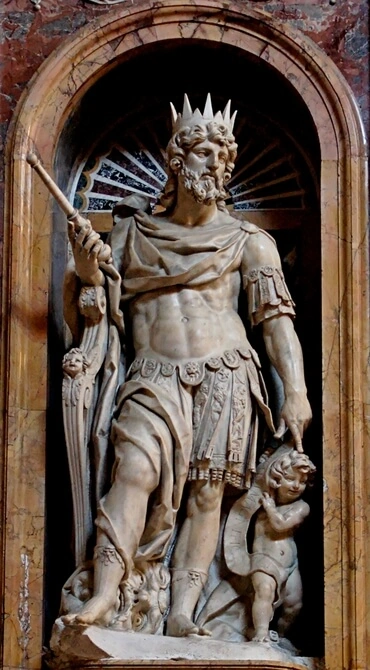1
Y vinieron todas las tribus de Israel a David en Hebrón, y hablaron, diciendo: He aquí nosotros somos tus huesos y tú carne.
2
Y aun ayer y anteayer, cuando Saúl reinaba sobre nosotros, tú sacabas y volvías a Israel. Además el SEÑOR te ha dicho: Tú apacentarás a mi pueblo Israel, y tú serás sobre Israel príncipe.
3
Vinieron, pues, todos los ancianos de Israel al rey en Hebrón, y el rey David hizo con ellos alianza en Hebrón delante del SEÑOR; y ungieron a David por rey sobre Israel.
4
Era David de treinta años cuando comenzó a reinar, y reinó cuarenta años.
5
En Hebrón reinó sobre Judá siete años y seis meses; y en Jerusalén reinó treinta y tres años sobre todo Israel y Judá.
6
Entonces el rey y los suyos fueron a Jerusalén al jebuseo que habitaba en la tierra; el cual habló a David, diciendo: Tú no entrarás acá, si no echares los ciegos y los cojos; pensando: No entrará acá David.
7
Pero David tomó la fortaleza de Sion, la cual es la ciudad de David.
8
Y dijo David aquel día: ¿Quién llegará hasta los canales, y herirá al jebuseo, y a los cojos y ciegos, a los cuales el alma de David aborrece? Por esto se dijo: Ciego ni cojo no entrará en casa.
9
Y David moró en la fortaleza y le puso por nombre la Ciudad de David; y edificó alrededor, desde Millo para adentro.
10
Y David iba creciendo y aumentándose, y el SEÑOR Dios de los ejércitos era con él.
11
E Hiram rey de Tiro envió también embajadores a David, y madera de cedro, y carpinteros, y canteros para los muros, los cuales edificaron la casa de David.
12
Y entendió David que el SEÑOR le había confirmado por rey sobre Israel, y que había ensalzado su reino por amor de su pueblo Israel.
13
Y tomó David más concubinas y mujeres de Jerusalén después que vino de Hebrón, y le nacieron más hijos e hijas.
14
Estos son los nombres de los que le nacieron en Jerusalén: Samúa, y Sobab, y Natán, y Salomón,
15
e Ibhar, y Elisúa, y Nefeg,
16
y Jafía, y Elisama, y Eliada, y Elifelet.
17
Y oyendo los filisteos que habían ungido a David por rey sobre Israel, todos los filisteos subieron a buscar a David; lo cual cuando David lo oyó, vino a la fortaleza.
18
Y vinieron los filisteos, y se extendieron por el valle de Rafaim (de los gigantes ).
19
Entonces consultó David al SEÑOR, diciendo: ¿Iré contra los filisteos? ¿Los entregarás en mis manos? Y el SEÑOR respondió a David: Ve, porque ciertamente entregaré los filisteos en tus manos.
20
Y vino David a Baal-perazim, y allí los venció David, y dijo: Rompió el SEÑOR mis enemigos delante de mí, como quien rompe aguas. Y por esto llamó el nombre de aquel lugar Baal-perazim (el llano de las divisiones o de las roturas ).
21
Y dejaron allí sus ídolos, los cuales quemó David y los suyos.
22
Y los filisteos volvieron a venir, y se extendieron en el valle de Rafaim.
23
Y consultando David al SEÑOR, él le respondió: No subas; sino rodéalos, y vendrás a ellos por delante de los morales;
24
y cuando oyeres un estruendo que irá por las copas de los morales, entonces te moverás; porque el SEÑOR saldrá delante de ti a herir el campamento de los filisteos.
25
Y David lo hizo así, como el SEÑOR se lo había mandado; e hirió a los filisteos desde Gabaa hasta llegar a Gaza.







